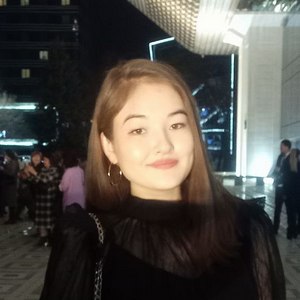Our testimonials: Nazerke

Our testimonials: Nazerke
Meet Nazerke from Kazakhstan
Student of Electrical Engineering
"Padova is a student city with so much charm. It's well-connected to places like Venice and Verona, but also full of its own beauty, energy, and opportunities"

About myself
My name is Nazerke, and I'm currently a Master's student in Electrical Engineering at the University of Padua. I graduated in 2023 with a Bachelor's degree in Electric Power Engineering from Al-Farabi Kazakh National University in Kazakhstan.
I chose Padua for its strong academic reputation, international environment, and hands-on approach to engineering education. Since arriving, I've taken part in technical visits, lab-based courses, and soon, an exchange semester at Boston University – all of which have broadened my academic and personal horizons.
Outside of class, I love exploring Padova, traveling around Italy, and connecting with fellow international students. Being here has been both a challenge and a gift, and I'm excited to share my experience to inspire others thinking about studying abroad.
Why did you choose the University of Padua and the Electrical Engineering degree programme?
When choosing a university for my Master's studies, I had several priorities: a strong academic reputation, practical learning opportunities, an international environment, and the chance to grow both personally and professionally. The University of Padua checked all those boxes and more.
Padua is one of the oldest universities in the world, and its legacy in science and innovation immediately impressed me. But what truly convinced me was how modern and dynamic the Electrical Engineering program is. The curriculum is designed to be both deep and practical, covering core subjects like power systems, control engineering, electronics, and signal processing, while also providing access to state-of-the-art laboratories and industry-oriented projects.
I wanted a program that didn’t just stay in the classroom. At Padua, we often visit power plants and industrial sites, which helps bring theory to life. I also appreciated how approachable the professors are – they genuinely want students to succeed and are open to discussions, questions, and new ideas.
The fact that the program is fully taught in English made it accessible, and the strong international focus of the university – including mobility programs like Erasmus+ and Ulisse – showed me that Padua encourages students to think globally. I’ve already taken advantage of this, and next semester I’ll be studying at Boston University through an exchange program.
Finally, I was drawn to Italy itself – the culture, the history, the quality of life. Padova is a student city with so much charm. It’s well-connected to places like Venice and Verona, but also full of its own beauty, energy, and opportunities. I felt like it would be the perfect place to build not only my academic skills, but also memories and friendships that would last a lifetime.
What are the main features of your degree programme?
The Master’s in Electrical Engineering at the University of Padua is both comprehensive and forward-thinking. It provides a solid foundation in theoretical concepts while also emphasizing practical, hands-on learning.
One of the main features is its balance between core electrical engineering subjects – such as power systems, automation, electronics, and control – and specialized courses that align with current industry demands. This structure allows students to build a strong general knowledge base while also exploring areas of personal or professional interest.
Another important aspect is the amount of laboratory work. We don’t just study circuits and systems on paper – we get to measure, test, and experiment with real devices. For example, in the Electrical Measurements course, we regularly work with equipment to collect and analyze data. These experiences help us develop not only technical skills but also confidence and problem-solving abilities.
The program also includes industrial visits and guest lectures from professionals in the field. These experiences bridge the gap between academia and industry, giving us insight into how engineering concepts are applied in the real world.
One of the unique strengths of the program is the strong support for internationalization. Courses are taught in English, and there are numerous opportunities for students to participate in exchange programs, internships, and research projects both in Italy and abroad. The professors and staff are also highly supportive, creating an environment where you feel encouraged to ask questions, seek help, and grow.
Overall, the program is designed not only to provide knowledge but to prepare students for their future careers in engineering – whether that’s in industry, research, or further studies.
What advice would you give to prospective students when it comes to preparing a successful application?
My biggest advice to future applicants is: be clear about your motivation and show your passion for the field. The University of Padua is looking for students who are genuinely interested in engineering and who are ready to take an active role in their learning journey.
Start by preparing a strong motivation letter. Instead of just listing your achievements, try to explain why you’re interested in the program and how it aligns with your future goals. Mention specific courses, research areas, or opportunities (like lab work or exchange programs) that excite you. This shows that you've done your homework and that you’re serious about making the most of the experience.
Also, make sure your CV is well-organized and highlights not only your academic background but also any relevant projects, internships, or extracurricular activities. If you’ve worked on any engineering-related problems or participated in competitions or student clubs, include that – it speaks to your initiative and practical experience.
For non-native English speakers, I recommend preparing early for the language requirements. Having a good command of English will make your studies smoother and help you fully engage with the international community here.
Lastly, don’t be afraid to reach out! I found it helpful to connect with current students and ask about their experiences. The university is also very responsive if you have questions about the application process.
What aspects of our university’s culture or values have resonated with you the most?
What I’ve found most inspiring at the University of Padua is its commitment to excellence, inclusion, and opportunity. From the very first days, I felt that this was a place where people are encouraged to be curious, to think critically, and to collaborate across cultures and disciplines.
One of the university's core values is freedom of thought – and it’s not just a slogan. In class, professors encourage open dialogue and diverse perspectives. You’re not just expected to memorize facts, but to understand and challenge ideas. This culture makes learning much more enriching and engaging.
Another aspect that really resonated with me is the university's strong support for international students. Moving to a new country can be overwhelming, but the International Desk was there for me at every step – from paperwork and housing to course enrollment and day-to-day questions. That level of support shows how much the university values inclusion and student well-being.
Padua is also deeply connected to the idea of community. You can feel it in the student groups, in collaborative projects, and in how easily you can connect with peers from all over the world. There’s a sense that we’re not just here to earn degrees – we’re part of something bigger: a legacy of knowledge, discovery, and shared growth.
What advice would you give to potential students thinking of studying in Italy? How has your experience in Padua been so far?
Italy is an incredible place to study – not just for its academic institutions, but for its lifestyle, culture, and people. My advice to anyone thinking of coming here is: be open-minded and embrace the experience fully.
When I first arrived in Padova, everything felt unfamiliar – the language, the systems, even small things like grocery shopping or taking the bus. But very quickly, I found that people were kind, welcoming, and willing to help. The Italian students were incredibly friendly, and the international community is strong and supportive.
My experience in Padua has been everything I hoped for and more. The city is beautiful and lively, full of students and rich in history. It has the perfect size – big enough to always have something going on, but small enough to feel safe and cozy. And because it’s so well connected by train, traveling to other parts of Italy (or Europe) is very easy.
Academically, I’ve grown so much. The classes are challenging but rewarding, and the resources available – from labs to libraries to exchange programs – are outstanding. I've also built friendships that I know will last for life.
So my advice is: don’t hesitate. Take the leap, come prepared to learn and grow, and you’ll be rewarded with an unforgettable experience.
What do you do when you’re not studying? How do you like to spend your free time?
Outside of class, I try to make the most of my time in Padova and enjoy the lifestyle that comes with being a student here.
One of my favorite things to do is just explore the city. Padova has a special charm – from its historic streets and piazzas to the beautiful Prato della Valle and the riverside walks. There’s always a new café to try, a local event happening, or a peaceful spot to relax with friends.
I also love traveling, and living in Italy makes that so easy. On weekends or during holidays, I often take short trips to nearby cities like Venice, Verona, Florence, or even the mountains. It’s a great way to recharge and experience the richness of Italian culture.
During the week, I spend time with fellow international students – cooking dinners together, organizing study groups, or simply hanging out at university events. There are also a lot of student clubs and activities, from language exchanges to tech meetups and cultural festivals.
For me, balance is key. While I take my studies seriously, I also believe that some of the most important growth happens outside the classroom – through friendships, cultural experiences, and learning how to live independently in a new environment.
MEET OUR TESTIMONIALS
Many students shared their experiences at the University of Padua.
Find out their stories!


